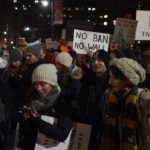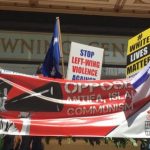Far Right Wing Politics – Fanning the Flames of Hate

It’s a month into Trump’s presidency, and in that time we’ve seen him produce a range executive orders delivering on several campaign promises: the defunct, soon-to-be newly-revised, Muslim ban, the $21.6 billion US-Mexican border wall proposal and a crackdown on undocumented migrants.
Commentators are no longer questioning whether the US president has any political knowhow – they’ve admitted he’s a wolf in sideshow clothing. The question being asked now is: how extreme does his administration have the potential of becoming?
And as the alt-right moves to the fore in the US political arena, it’s becoming apparent that the Australian far-right is digging its claws in deeper as well.
The racists mobilise politically
For years now, we’ve seen rallies organised by organisations such as Reclaim Australia, and the splinter group the United Patriots Front, with Anglo-Australians spouting anti-immigration rhetoric. Pauline Hanson was warning of an Asian invasion as far back as the 1990s.
But it seems that while the One Nation party leader’s policy ideas might not have developed any greater sophistication since then, her politicking has. Protesters draped in the Australian flag have more legitimate representation in parliament these days.
The creed of the far-right
Former federal opposition leader Mark Latham is now a leading proponent of the Australian far-right political agenda. In a recent article in the Daily Telegraph, he predicted that a “Trump/Brexit-style revolution” will threaten the stability of the Australian two-party system.
Latham then proceeded to outline the creed of the Australian far-right, or what he termed the “Outsiders’ Manifesto.”
Reading like a Donald Trump campaign speech, the manifesto includes cuts to immigration and refugee numbers, “an end to social engineering programs” – such as section 18C of the Racial Discrimination Act, and “man-bashing government agencies” – along with the promotion of western civilisation and a push back against “radical Islam.”
The rise of One Nation
On the announcement of Trump’s election victory, many politicians in Canberra took a moment to get over their initial shock. However, Pauline Hanson, along with a few of her One Nation cohorts, were celebrating his win with a champagne toast.
“Give people the power back to have their own democracy,” Hanson declared on the lawn at Parliament House. “I think Donald Trump will bring that to America. And I can see in Donald Trump a lot of me and what I stand for.”
And indeed last August, during her maiden speech, the senator called for a Muslim ban and a halt to immigration altogether, warning that Islam has a political agenda, lashing out at single mothers and claiming the Family Court was anti-male.
As Fairfax Media reported last month, the Australian Institute has released a paper tracking much of One Nation’s anti-Islamic rhetoric – particularly its declarations that Islam is not a religion, but rather a political movement – consistent with alt-right commentators from the US and Europe.
The institute’s Philip Dorling traced the party’s anti-Muslim sentiments to the online media outlet Breitbart. The alt-right site’s former chief executive is Steve Bannon, who is now the White House chief strategist for the Trump administration.
Growing influence on government
We’re not about to see Hanson elected as prime minister, but the influence of One Nation on mainstream politics is increasing. The party’s numbers in the Senate have led the Turnbull government to make deals with them for support over issues, such as welfare cuts and ABCC legislation.
One Nation has had a surge in popularity in Queensland. Support for the party has jumped from 16 to 23 percent over the last three months alone. This could see the party win more than 20 seats in next year’s state election and hold the balance of power.
And in a desperate attempt by the Western Australian Liberal party to gain victory in the state’s March election, the Barnett government has struck a preference deal with One Nation, which will place them ahead of the Liberal party’s traditional coalition partner, the Nationals.
Turning away from traditional parties
Dr Jean Jonathan Bogais believes the Australian political climate is ripe for a rise in the far-right movement, as there is “growing discontent” with mainstream politics.
The adjunct associate professor at the School of Social and Political Sciences at Sydney University foreshadowed that as dissatisfaction with the major parties grows, the power will “fall into the hands of Pauline Hanson, Cory Bernardi and the Q Society.”
As Dr Bogiais rightly points out, it’s not just Hanson’s party making waves. Ultra-reactionary senator Cory Bernardi announced on February 7 that he was quitting the Liberals to form his own political party, the Australian Conservatives.
And while it’s thought the senator – who’s known for his anti-gay, anti-Islamic, climate change denying stance – might initially have a hard time gaining traction, his defection from the Liberals and the formation of his own party is another example of an emerging populist far-right.
The Q Society
Mr Bernardi also throws his weight behind the Q Society, a group that’s been in the press for all the wrong reasons in recent weeks. At a dinner held at Sydney’s North Ryde RSL two weeks ago, the ultra-right group seemed intent on offending everyone they could.
Cartoonist Larry Pickering declared on the night that he couldn’t “stand Muslims,” except when they “chuck pillow-biters off buildings.” While former Liberal MP Ross Cameron said he didn’t mind if the NSW Liberals “are gay,” but he just wished, “like Hadrian, they would build a wall.”
And thus the ugly side of middle Australian politics begins to publicly reveal itself.
A western phenomenon
Dr Bogais told Sydney Criminal Lawyers® it needs to be understood that the rise of the far-right in countries like France, Hungary and Romania, along the Brexit vote and the election of Trump, are all interconnected.
The doctor theorises that a “subtle form of revolution” is occurring throughout the globe, especially in the west. It began back in the 1990s “with the emergence of the market economy and liberal democracy,” as well as “the fall of the Soviet Union.”
According to Dr Bogais, political events around the world have led to a crisis, and “the rise of the nationalist movement” is to be expected, as forces such as these “always prevail” in times of difficulty.
“It’s no surprise that we have Donald Trump” or France’s Marine Le Pen, he said, as these leaders are reflecting “what our society has become” in the face of perceived crises.
“So we have a global phenomenon. And we are probably entering the last part of this revolution,” the doctor explained. “And that’s when we are potentially at risk, because conflict could develop from that.”
Identifying enemies
In an “us versus them” environment, it becomes easier for governments to remove legal safeguards and protections ostensibly to protect the “desirable” class against “undesirables”; which is precisely what ultra-far right German nationalist leader Adolf Hitler achieved by demonising Jews, those on the left wing (especially communists), judges and media groups who refused to toe the Nazi party line.
Hitler and the German people came to the view that these enemy groups were responsible for the demise of society – that they presented an unacceptable threat which had to be suppressed at any cost, including the surrender of basic civil liberties and the ultimate persecution of those groups.
Fast forward to today, and the same types of rhetoric are being used by the far-right to demonise immigrants and Muslims – using the threat of terrorism to justify the enhancement of state power at the expense of civil liberties – and even judges such as US Judge James Robard who refused to enforce Donald Trump’s ‘Muslim ban’, and media outlets such as CNN and the New York Times who Trump has attacked as being “fake news” and taken the extraordinary step of shutting them out of a recent press conference, clearly because they are not as sympathetic to him as many other media organisations.
However, such attacks do more than act as a justification for the removal of freedoms, safeguards and protections – they create divisions which can lead to animosity, reprisals and even conflict on a large scale.
It seems that those spouting hateful rhetoric have learned little from lessons of the past.








